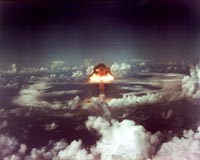The nuclear arms race and national sovereignty
Are we moving towards a lawless world in which only countries with second-strike nuclear capability will have real national sovereignty? Some countries seem to think that the only way a country can be protected from the actions of international (nuclear) bullies is to acquire the deterrence that having nuclear weapons offers. Countries such as North Korea, Iran, Israel, Brazil and others seem to have reached the conclusion that in a world where international law is violated with impunity and where the United Nations Charter is a dead letter, a government that does not plan for the acquisition of nuclear armaments is derelict in its duties toward its citizens. In fact, it is estimated that between 30 and 40 non-nuclear countries have the technical skill, and in some cases the required material, to build an atomic bomb. What is required for these countries to jump onto the nuclear wagon is a few more years of irresponsible US foreign policy.

On October 9, 2006, the relatively small Communist country of North Korea (DPRK) (population 23 million) announced that it had completed its first test of a low-yield nuclear device in an underground facility, thus presumably entering the club of countries with nuclear capabilities (USA, Russia, China, France, United Kingdom, India, Pakistan, Israel). The North Korean government said that it conducted the test to demonstrate its military technology in the face of perceived threats from the United States. This led the U.N. Security Council to adopt sanctions against North Korea, under its U.N. resolution 1718, which in effect imposes a dangerous naval blockade of the country, but ironically rules out expressly military action against it. In fact, however, such an embargo may lead to a military conflict on the Korean peninsula. Therefore, even though only 5 percent of Americans favor a military conflict with North Korea, in the end, that is likely what the American people are going to get. Indeed, if the U.N. resolution about boarding and searching ships bound for and leaving North Korea is implemented too aggressively, the risk of a military incident is very high.
The Neocons in the U.S. administration, led by Vice President Dick Cheney, never believed in the use of negotiations, to settle conflicts. Their favorite way has always been the bullying way. As a matter of fact, the U.S. government has refused to negotiate directly with the North Korean government since 2001, raising the worst fears in the latter. Indeed, in March 2001, then Undersecretary of State for Nonproliferation John Bolton willfully sabotaged any diplomatic effort to address North Korea's fears. Diplomatic talks with North Korea were suspended, and in his State of the Union Address of January 2002, George W. Bush labeled North Korea, in his inflammatory language, as one of the three legs of the "Axis of Evil." This brinkmanship approach to international relations was in clear contrast to the approach of the Clinton administration, which carried on productive bilateral talks with Pyongyang.
In 1994, for example, the U.S. persuaded North Korea to stop work on the nuclear power plant it was building, in exchange for the U.S. building cold-water reactors that would give North Korea the electric power it needed. But the Neocon Bush-Cheney administration was not interested in such a reasonable approach and went full speed ahead with its right-wing foreign policy agenda, even going as far as refusing to talk to North Korean officials.
Year after year, the club of nuclear-weapons countries keeps getting larger and larger as more countries embark upon a strategy of nuclear deterrence to protect themselves from larger countries that indicate openly their willingness to act as imperial powers, somewhat along the lines of the old empires of the 19th century. Understandingly, some governments think it is their paramount duty to protect their country from foreign imperial domination.
In principle, any nation is entitled to possess nuclear weapons for its own defense. But to avoid a dangerous proliferation of nuclear arms, many nations chose not to have them and elected instead to rely on international law to preserve national sovereignties. That is what happened in 1968 when most sovereign nations signed the Treaty on Non-Proliferation of Nuclear Weapons (NPT). Today, 188 nations have signed the NPT, but India, Pakistan, Israel and North Korean are not recognizing it. The purpose was to simultaneously attempt to reduce and disarm existing nuclear stockpiles without blocking the production of peaceful nuclear energy. Indeed, the Treaty contained three pillars: non-proliferation, disarmament, and the right to use nuclear technology peacefully. This meant that non-nuclear nations accepted not to develop nuclear weapons on their own, while the existing so-called nuclear powers committed themselves not to "induce any non-nuclear-weapon State to ... acquire nuclear weapons." Implicitly, it was understood that no country would ever use or threaten to use nuclear weapons.
In 1975, in a parallel agreement, some 44 nuclear-supplier states voluntarily accepted to coordinate their controls regarding the export of nuclear-related materials, equipment, and technology. These so-called NSG members, including the United States, are expected to forgo nuclear trade with governments that do not subject themselves to the International Atomic Energy Agency Safeguards regime, while the IAEA has the responsibility for verifying that these countries' exports are not used by the importing state for any military purpose.
The Bush-Cheney administration is the principal culprit behind the present rush toward nuclear weapons because it has violated both the spirit and the letter of the Non proliferation treaty (NPT). Indeed, it gave a very bad example in announcing, in its 2001 Nuclear Posture Review, that first, it was keeping its nuclear options wide open, including the use of nuclear weapons in response to chemical or biological attacks or unspecified "surprising military developments", and second, that the U.S could seek to develop, and possibly test, new types of nuclear weapons in the future, such as "mini-nukes" to attack underground bunkers.
Considering that the Bush-Cheney administration has adopted a policy of preemptive use of nuclear weapons against non-nuclear states as an integral part of its global military strategy, it should surprise no one that a nuclear weapons arms race is now going full speed ahead among some smaller nations, anxious to protect themselves from foreign interference or foreign blackmail.
Moreover, it can be argued that the United States has also violated the Non proliferation treaty (NPT) when it signed, on March 2, 2006, a nuclear cooperation agreement with India, which has obvious military applications. Indeed, by agreeing to supply nuclear reactors, fuel and expertise to help India produce larger quantities of plutonium, without insisting that India sign the Non-Proliferation Treaty, the Bush-Cheney administration has given the appearance of 'rewarding' India for its non compliance with the NPT. This is on top of the fact that the U.S. has, for years, assisted the government of Israel in building its stockpile of nuclear bombs, without insisting that the latter country join the NPT. Therefore, it can be said that the genie is out of the bottle and it is difficult to see how it could be put back in. Other nuclear powers have followed on the American path. Great Britain and France, for example, have indicated that they may use nuclear weapons in response to a non-conventional attack by "rogue states". The introduction of such preemptive-strike doctrines and the adoption of external threatening postures in the affairs of other sovereign states have considerably reduced the legitimacy and logic of the Treaty on Non-Proliferation (NPT). In fact, it may have emasculated it.
What is even more problematic is the fact that some of the countries that are not party to the NP Treaty (Israel, India, Pakistan) have developed nuclear weapons programs of their own, without being subjected to sanctions, while other countries trying to do the same thing (North Korea and Iran) have been threatened with pressures and retaliation. This smacks of a double standard and has considerably reduced confidence in the fairness of international agreements.
What would seem to be badly needed is some international political leadership along with some vision to convene an international conference with the main purpose of outlawing nuclear wars once and for all, and for destroying all stocks of nuclear weapons. Without such a bold move, the nuclear arms race will only intensify in the coming years, significantly raising the risk of a nuclear conflagration.
Rodrigue Tremblay
Subscribe to Pravda.Ru Telegram channel, Facebook, RSS!




